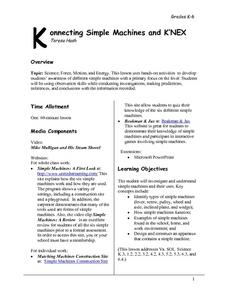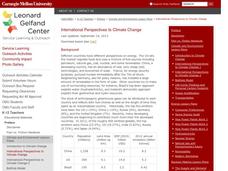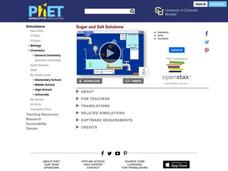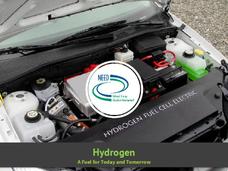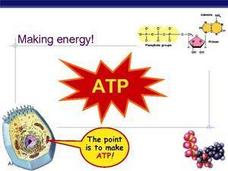Curated OER
Konnecting Simple Machines and K'Nex
Learners study and identify different types of simple machines and how they work. They design a simple machine.
Curated OER
Aerosol Science
In this aerosol instructional activity, students are given data for volcanic eruptions and the average temperatures of the Earth. They determine the change in temperature from the year of the eruption to the present year and use the...
Curated OER
Light
Students explore light. In this light wave physics lesson, students construct periscopes, kaleidoscopes, color wheels, and pinhole cameras. Students observe and record characteristics of light demonstrated through the use of...
Curated OER
Electrolysis of Water
Ninth graders examine the electrolysis of water by completing an experiment. In this water lesson plan students will explain how hydrogen can be extracted from water and how energy flows through an electrolysis system.
Curated OER
The Energy of Light
Students discuss different ways engineers use light. For this engineering lesson, students are introduced to the properties of light and the way light is used. They view a demonstration of light waves using a slinky, and practice using...
Curated OER
The Web of Life
Learners explore the interconnectedness of living things in an ecosystem. They use pictures and arrows to develop a food web, and participate in constructing a class food web with students representing various parts of the web.
Curated OER
An Introduction to Thermal Spray Technology
Students discuss difference between kinetic and thermal energy, develop and demonstrate understanding of key concepts and characteristics underlying thermal spray techniques, list items used in their daily lives that are coated, examine...
Carnegie Mellon University
International Perspectives to Climate Change 1
After a lecture about how the first industrial revolution triggered the path to climate change, your environmental studies class discusses what the impacts are. In a culminating activity, they get into groups and identify countries on a...
PhET
Sugar and Salt Solutions
Ionic bonds form from electrostatic energy, allowing for higher conductivity than those seen in covalent bonds. In the simulation, learners add sugar and salt to water and see the effects on concentration and conductivity of their...
National Energy Education Development Project
Introduction to Hydrogen
Every region has a renewable resource that can be used to make hydrogen. But, what is hydrogen and why can it be used as an energy source? Find out with a presentation that answers these questions and then discusses where hydrogen is...
National Institute of Open Schooling
Chemical Thermodynamics
All chemical reactions require energy. To explore thermodynamics, classes read and discuss its laws, exothermic and endothermic reactions, enthalpy in many forms, calculate enthalpy problems, and use Hess' Law to calculate enthalpy of a...
Re Energy
Build Your Own Biogas Generator
What is biogas and how is it made? After examining background information about the sources of biogas and biogas generators, class members follow the provided information and build a biogas generator that can be used in the...
Cornell University
Bacteria Take Over and Down
Bacteria outnumber all other forms of life on Earth. Scholars observe the growth of bacteria in petri dishes to understand their role in maintaining good health. Then, they observe the growth of bacteria after they introduce...
Curated OER
Unit 3 Bonding
An organized table charting the different types of chemical bonds arrays this resource. The octet rule, ionization energy, and the naming of compounds are also reviewed. Young chemists answer review questions in multiple choice fashion....
Curated OER
Typical Numeric Questions for Physics I - Photoelectric Effect
As the title implies, here is a collection of typical photoelectric effect problems that physics learners need to be able to solve. They determine the amount of energy of a photon, the photons produced per second, the frequency required...
Hawaiʻi State Department of Education
Theme and Variation
The dance elements of body, energy, space, and time are the focus of a lesson on movement and theme. The class follows along as the teacher shows them a new dance that has a theme. They practice the dance, and then change one element in...
Rhythm Rhyme Results
Whatʼs the Same and Whatʼs Different?
Learn about radiation, convection, and conduction with a multiple choice worksheet. Each question prompts kids to decide what is different about each form of heat energy transfer, and what is the same.
National Institute of Open Schooling
Spontaneity of Chemical Reactions
Do spontaneous reactions really occur? Activity 12 in a series of 36 focuses on spontaneity of chemical reactions. Learners read about, discuss, and answer questions pertaining to entropy, explain the third law of thermodynamics, explore...
Science Matters
Wave Watching
Seismologists use the direction and arrival times of p waves and s waves to determine the distance to the source of an earthquake. The engaging activity has students line up to form human waves. Through different movements when attached,...
Curated OER
Breathing Victory
Students know that participation in sports requires energy. They comprehend that we get energy form the foods that we eat and the air thta we breathe. Converting food and air into usable energy is defined as celluar respiration. Students...
Curated OER
The Point is to Make ATP
Storing and transferring energy is explained here with reference to the fight or flight response, along with the need for activity in times of lowered nutrition. This is a great summary of ATP applications, and after the multiple stages...
K12 Reader
Waves and Currents
Waves, currents, crests, and troughs. Using information provided in an article about waves and currents, readers define terms used to describe how energy travels.
Curated OER
Hello, Is Anybody Out There? (cont.)
In this space science worksheet, students read an informative passage about radio waves and the possibility of sending messages in space. The passage describes a "Sounds of Earth" record on the Voyager satellite which contains messages...
Curated OER
Volcanoes: Third Grade Lessons Plans and Activities
Discover how rocks are formed from volcanoes during a geology pre-lab activity. Third graders describe the volcanic rock samples and creating a model of Mt. Lassen, located in California. The lesson culminates in...
Other popular searches
- Energy Forms
- Forms of Energy Worksheets
- Alternative Energy Forms
- The Forms of Energy
- Different Forms of Energy
- 6 Forms of Energy
- Forms of Energy Poster
- Alternative Forms of Energy
- Science Forms of Energy
- Various Forms of Energy
- Sound Energy Forms
- Energy Forms Chemical Energy


